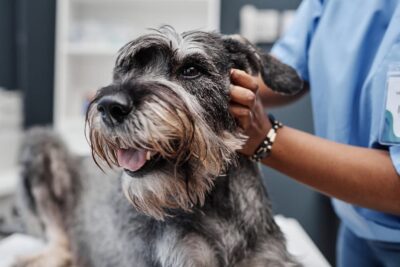Black Dog Tongue: Is It Normal?

When most people think about a dog’s tongue, they likely envision a pink, slobbery one that gives kisses and hangs adorably out of a dog’s mouth. But not all dogs’ tongues are pink. In fact, some dogs have black, blue, purple, or spotted tongues.
But is a black dog tongue normal? We’ll cover this topic and talk about pigmentation, different breeds who have black dog tongues, and if a black or discolored tongue could signal a medical problem that requires veterinary attention.
Black Dog Tongue: What Does It Look Like?
A dog can have extra pigmentation in their tongue that makes it appear black, blue, or purple. Pigmentation in a tongue can make the overall tongue black or blue, or it can create dark pigmented spots on a tongue that is otherwise pink.
Black or spotted tongues like this are completely normal – the coloration is just extra pigment. Most dogs that have black, blue, purple, or spotted tongues are born that way.
As a dog ages, the color of the tongue or the spots may change a little and get darker or spots might slightly change shape, but in general, the tongue color and spotting that a dog is born with is the way it will stay for the life of the dog.
Black, blue, and purple tongues and dark spots are flat just like a pink tongue, have the same texture, and do not have any bumps or raised areas.
Is It Normal for Dogs to Have a Black Tongue?

Dogs that are born with black or spotted tongues (or blue or purple) are considered normal. The dark color and spots are just highly pigmented cells on the surface of the tongue, and are similar to freckles in humans.
Another way to think about the variety in the color of dog tongues is to think about how some dogs have black skin, other dogs have pink skin, and some dogs have both. Dogs can have dark pigmentation on their skin, lips, around their eyes, eyelids, paw pads, toenails, and as you now know, on their tongues as well. In addition to having a black or spotted tongue, dogs can have black or spotted gums and lips as well.
While a pigmented black dog tongue can be considered completely normal in many dogs, there are some medical conditions that can cause tongue discoloration.
Abnormal things to watch for include:
- Rapidly appearing dark spots on the tongue or a dark spot that starts changing appearance rapidly. These can be a sign of cancer, trauma, or bleeding disorders.
- Spots or discoloration of the tongue that also have a different texture than the rest of the tongue or are bleeding
- Foul odor coming from the mouth
- Bleeding and blackened gums around teeth. This can be associated with periodontal disease
- Weakness, collapse, or difficulty breathing with blue gums is a medical emergency
Regardless of whether your dog has a black tongue, pink tongue, or a spotted tongue, it is a good idea to regularly check your dog’s teeth, gums, and tongue for any changes. Seek veterinary attention if you notice anything out of the ordinary or if you have questions about your dog’s black tongue.
Dog Breeds with Black Tongues

Chow Chow dogs are bred to have solid blue-black tongues, and tongues that are black on the top and edges are actually considered to be a breed standard in this breed. Shar Peis are also bred to have blue-black tongues as well as blue-black gums and roof of the mouth.
Shar Peis and Chow Chows aren’t the only dog breeds that have darkly pigmented or spotted tongues. In fact, there are many dog breeds that have black or spotted tongues. Darkly pigmented tongues are more common in dogs that have black points (black eyebrows, shoulders, lips, etc.). In addition, dogs that are closely related to Chow Chows in the Spitz family, Mastiff breeds, and Setter, Spaniel, and Pointer breeds are prone to having black tongues.
These breeds can include (but are not limited to):
- Rottweiler
- Airedale
- Labrador Retriever
- Pitbull
- Mastiff
- German Shepherd
- Newfoundland
- Golden Retriever
- Akita
- Irish Setter
- Great Pyrenees
- Pomeranian
- Dalmatian
- Australian Shepherd
- Shiba Inu
- Siberian Husky
- Belgian Malinois
- Australian Cattle Dog
- Belgian Sheepdog
- Bichon Frise
- Cairn Terrier
- Collie
- Cocker Spaniel
- Doberman Pinscher
- Gordon Setter
- English Setter
- Tibetan Mastiff
- Flat-Coated Retriever
- Rhodesian Ridgeback
- Soft-coated Wheaten Terrier
- Kerry Blue Terrier
- Keeshond
- Pug
Should You Worry About Your Dog’s Black Tongue?

In general, if your dog is healthy, happy, and has had a black, purple, blue, or spotted tongue their whole life, then there is nothing to worry about.
As stated above, if you notice rapid changes in your dog’s tongue such as a new spot appearing or a change in texture or any raised areas, or if your dog is acting sick in any way in conjunction with a change in tongue appearance, it is important to seek the services of a veterinarian as soon as possible.
The main concern with black spots suddenly appearing on otherwise pink tongue or gum tissue is oral melanoma.
Oral melanoma is a tumor of melanocytes, which are pigmented cells. Oral melanoma can appear on the tongue, gums, or roof of the mouth, and is usually a malignant tumor that invades surrounding healthy tissue, including the jaw bone and skull, and spreads to other areas of the body, including lymph nodes, lungs, and bones.
Oral melanoma is more common in some dog breeds that have naturally black-blue tongues, including Chow Chows, Retrievers, and Cocker Spaniel. It is also more common in Miniature Poodles and older dogs in general.
The main signs associated with oral melanoma include:
- Tumor-like growth on tongue or gums, may or may not be pigmented, often bleeding
- Drooling, often bloody
- Bad breath
- Difficulty eating
- Loose teeth or pain
The prognosis for oral melanoma is better if the disease is caught early, the tumor is surgically removed, and the dog is treated with chemotherapy.
Oral melanoma is one of the reasons why it is important to regularly monitor your dog’s oral health and see a veterinarian if you notice any changes in your dog’s mouth or if you are worried about a black or spotted tongue.









